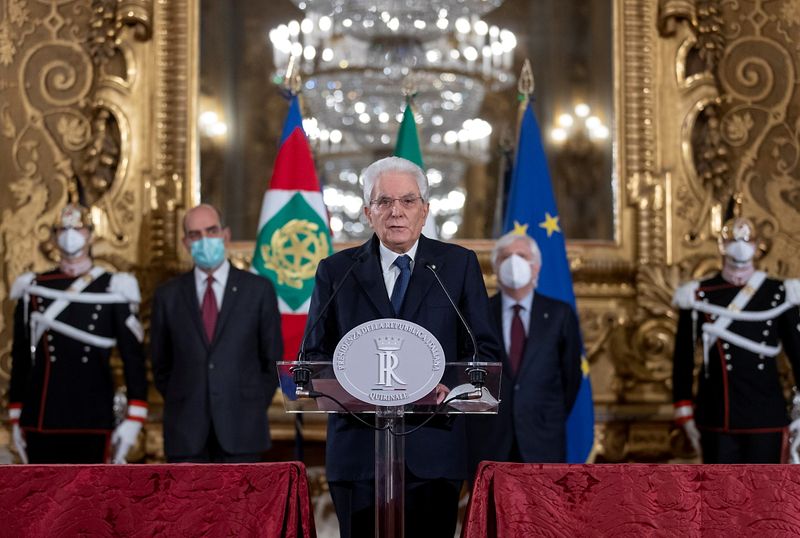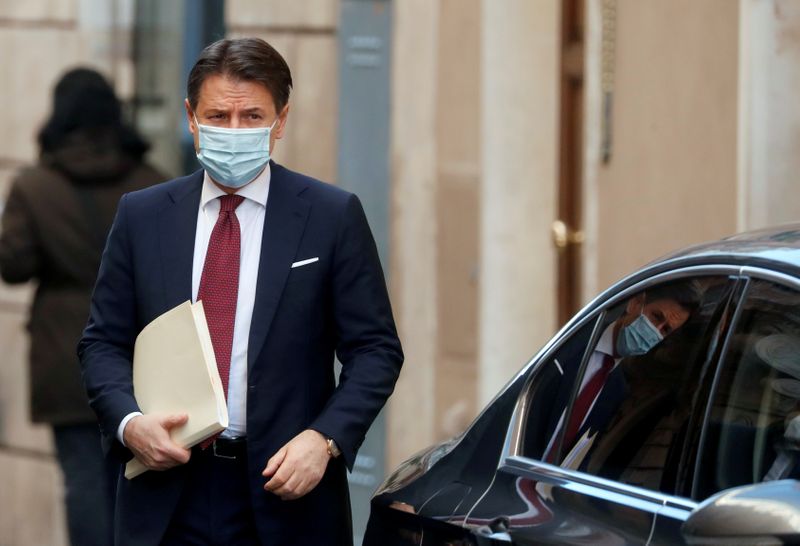By Crispian Balmer and Angelo Amante
ROME (Reuters) - Italian President Sergio Mattarella looks set to ask former European Central Bank chief Mario Draghi to form a government of national unity to tackle the twin coronavirus and economic crises battering the country.
The head of state summoned Draghi for talks on Wednesday at noon (1100 GMT) after hearing that efforts to salvage the collapsed coalition of Prime Minister Giuseppe Conte had failed.
"I have a duty to appeal to all political forces (to support) a high-profile government," Mattarella told reporters, ruling out the only other possibility, early elections, as ill-advised given the array of challenges facing Italy.
Draghi is widely credited with pulling the euro zone back from the brink of collapse in 2012, pledging to do "whatever it takes" to save the single European currency.
He has largely vanished from the public eye since his ECB term ended in October 2019, but his name emerged as a potential premier in recent weeks as political turmoil combined with the health and economic emergencies to form a perfect storm.
The first European country to be hit by the coronavirus, Italy has seen more than 89,000 deaths since its outbreak almost a year ago -- the sixth-highest toll in the world.
Lockdowns aimed at curbing the contagion have devastated the economy and data released on Tuesday showed that Italy's gross domestic product (GDP) shrank by 8.8% in 2020 -- its steepest annual drop since World War Two.
Mattarella said one of the most important things the next administration had to do was to draw up rapidly plans for how to spend more than 200 billion euros ($243 billion) from a European Union fund designed to help overcome the economic slump.
"NO WAY"
Draghi made no immediate comment on the presidential summons and it was not initially clear which parties in the deeply fractured parliament would support an administration he headed.
A senior member of the anti-establishment 5-Star Movement, the largest party in parliament and a key member of the last two coalition governments, said the group would never back a government led by Draghi.
"No way," he told Reuters, declining to be named.
By contrast, the 5-Star's main coalition partner, the centre-left Democratic Party (PD), said it was ready to support the former central banker. Mattarella's initiative "has remedied the disaster," said PD leader Nicola Zingaretti.
Matteo Renzi, who triggered Conte's downfall last month by withdrawing his small party from the government in protest at its handling of the pandemic, also pledged support.
All eyes will be on the parties in the right-wing opposition bloc, which includes Matteo Salvini's eurosceptic League, the far-right Brothers of Italy and centre-right Forza Italia.
While Forza Italia was widely expected to rally to Draghi's side, Brothers of Italy indicated that it would remain in opposition. This might mean that the League could make or break the mooted administration.
A Draghi government would reinforce Italy's international standing at a time when it has the presidency of the G20. But taking the job would carry risks for the 73-year-old economist.

The last time a technocrat took charge was in 2011, when another economist, Mario Monti, was entrusted with helping Italy out of a debt crisis. Parliamentarians soon turned on him when they deemed that his economic medicine was too pungent.
